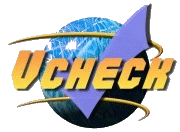"How often does a truly efficient - as advertised - effective and inexpensive product come along? Not very often. But one of my colleagues introduced me to Vcheck after she had been very satisfied with it. Thank goodness she did. I don't often promote businesses or services, but this product actually delivers what it says it will. I was amazed at its comprehensive content and its user friendly capabilities. I highly recommend this product to ANYONE in this industry."
N. Walker, American Insurance Professionals, LLC
Will My Bank Accept Demand Drafts Created by Vcheck?
First of all, before you even ask someone at your bank if they will accept the checks produced by our system, if you are printing them on blank check stock, and using MICR toner to do so - DON'T EVEN ASK - just hand your deposit to the teller and they will go right through - especially if you are using our exclusive E-Sign Signature Capture feature.
We've had customers tell us they bank at Wells Fargo, and they asked at their branch and were told by the staff the checks would not be accepted. Funny thing is, we (SSNet, Inc.) bank at Wells Fargo and have processed 1000's of Vcheck made payable to us through our Wells Fargo account without a single question ever being asked.
However, many banks and/or their staff do not understand or have never seen a demand draft, and therefore will tell you they can not accept them. They may give you one of the following reasons:
1. Because the checks you present are not printed in magnetic MICR toner and can't be scanned.
While the use of magnetic toner is not required by banking regulations, some banks can get picky about this. You best solution is to either use MICR Toner, or find another bank that considers re-encoding checks just part of their customer service.
2. They say they can't take a check that does not have a signature.
This entire problem can be avoided if your customer's are using the secure Vcheck form to submit the payment and you are using our exclusive Electronic Signature Capture. The checks you print will contain the customer's signature! See the Signature Capture page for complete details.
However, if you print checks you received by phone or fax, a block of text approved by the American Bankers Association will appear instead of the signature. Your bank may say they can't accept such a check. Again, this is because they simply are not familiar with "Demand Drafts" or "One-Time Paper Drafts". In essence, every US bank must accept properly authorized demand drafts. Feel free to present the following to your bank:
Check demand drafts, or "drafting" funds from a second party's checking account, have been a method of payment for more than 15 years, usually in collections. Check drafting is a legal method of payment as provided in the Uniform Commercial Code, Federal Trade Commission Title 16, and Code of Federal Regulations. Of course, authorization from the checking account holder to generate a check draft is mandatory, and verbal or written agreement is accepted.
Uniform Commercial Code - Reference: Title 1, Sections 1-201 [39] and Title 3, Sections 3-103a, 3-104, 3-401, 3-402, and 3-403. Federal Trade Commission - Reference: Telemarketing Sales Rule - Title 16, Section 310.3 (a)(3). Code of Federal Regulations - Reference: Title 12 Chapter II, Part 210. Federal Reserve Bank - Reference: Regulation J, Part 2, Sections 4a-201 to a-212.
How to Authorize Direct Debits
To authorize a direct debit to your account, usually for a one-time transaction, you give the person you're paying your bank account number. You may also give the company the number of your next unused check. Either they or a third party verifies your account information and, as your agent, prepares a paper draft (also called a "sight draft" or a "demand draft"), which the bank treats like a check except that you never sign it.
There is, right now, no regulation requiring your written authorization for this kind of debit.
Finally, you can print the Who Uses It page and present it to your bank. It is a partial list of the businesses and government agencies that use the same exact system you are using to print the same exact type of checks. Every one of the banks they use - and that would cover pretty much every major bank in the US - gladly accept the checks produced by our system.
If your bank still refuses to accept these demand drafts, they are in clear violation of the Uniform Commercial Codes, the Federal Trade Commission and rules set forth by the American Bankers Association - and therefore, it might be wise to find another bank for your business.
